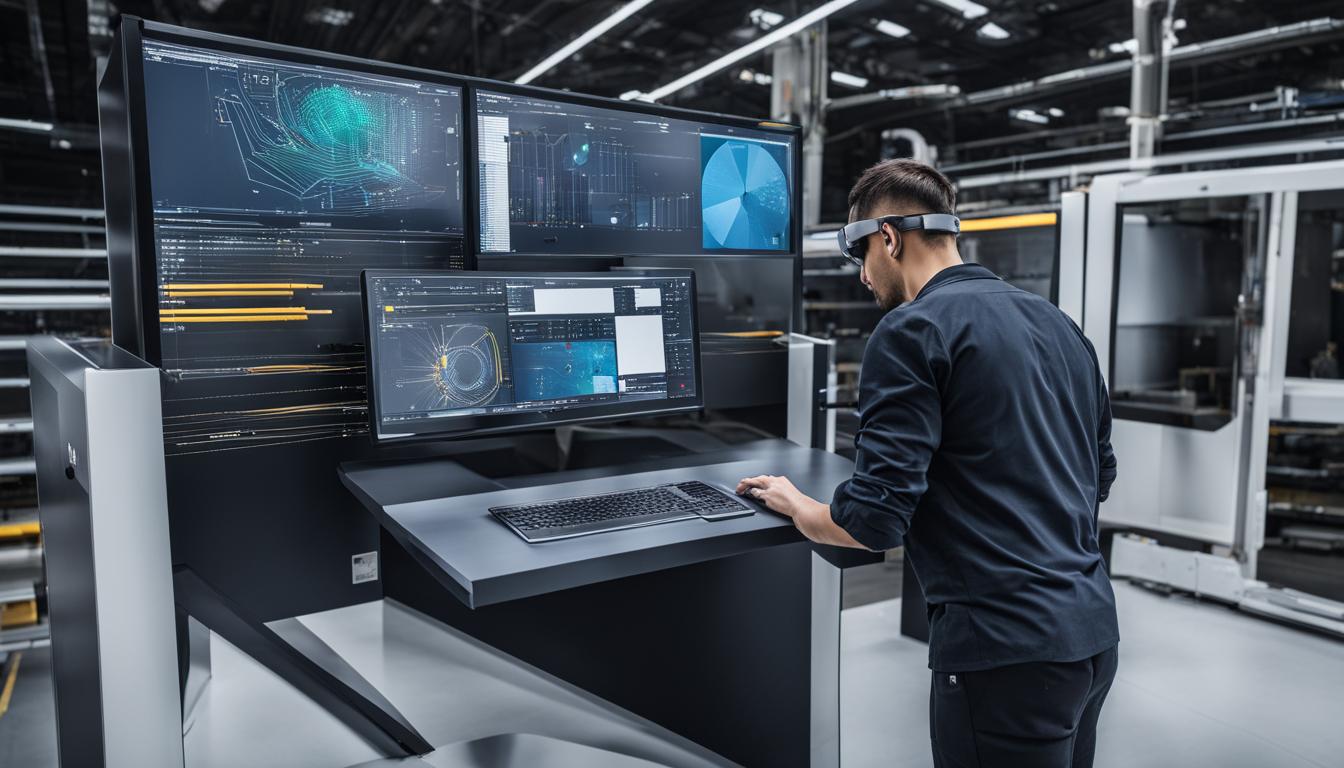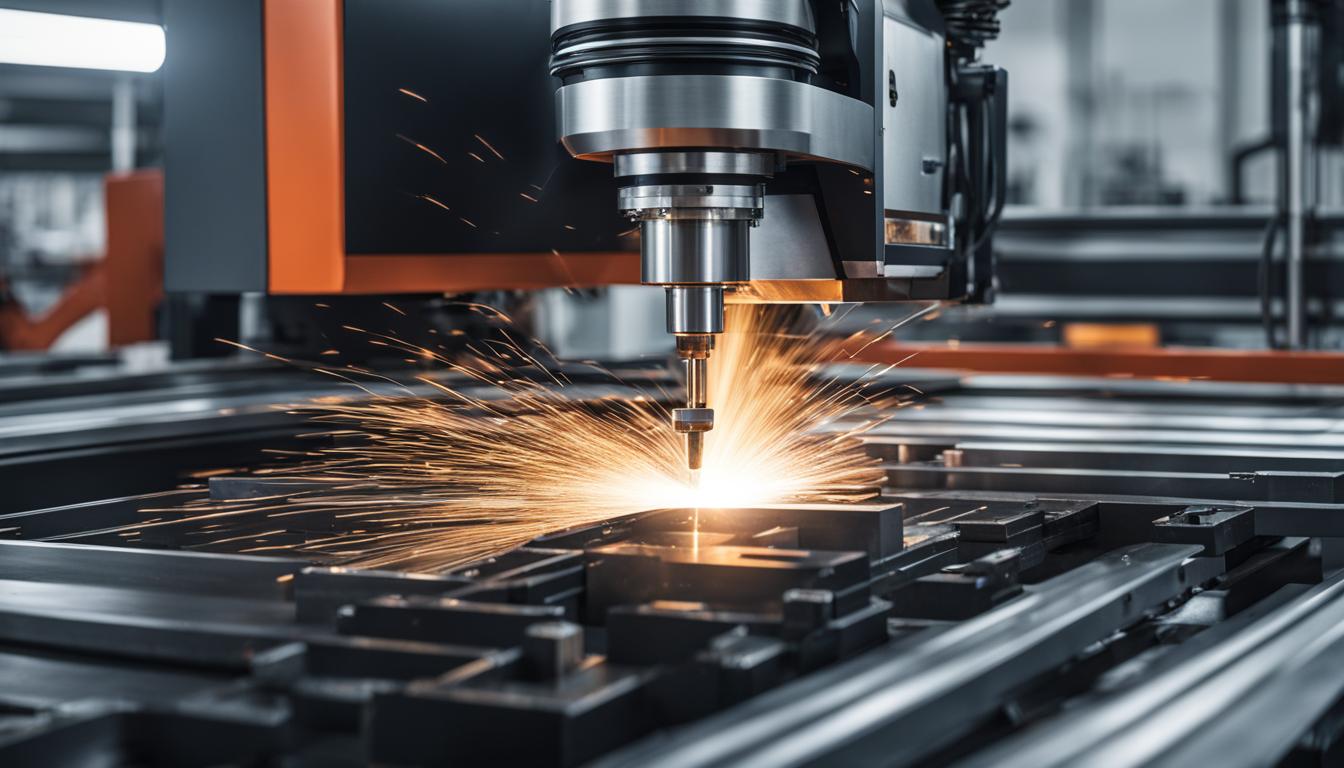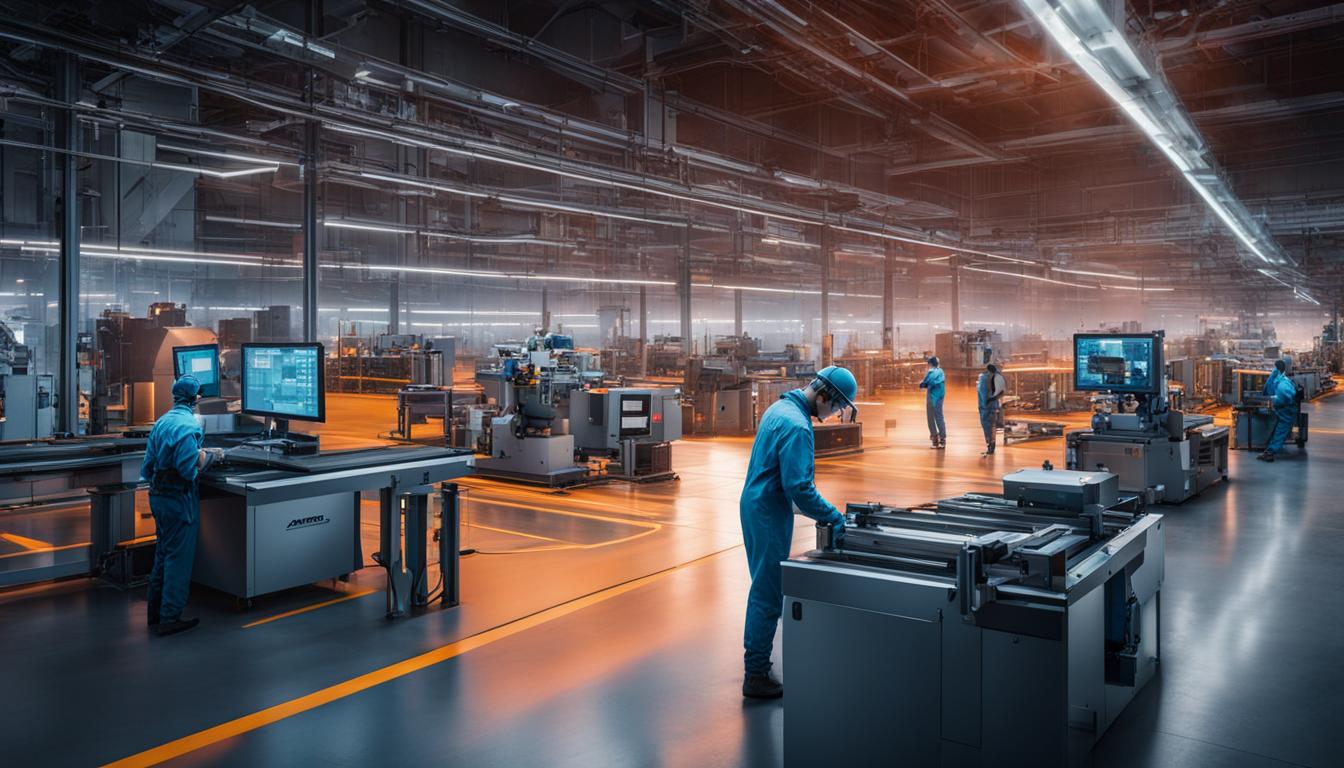The year 2024 marks a significant shift in the world of manufacturing, with the integration of AI in CNC milling poised to revolutionize the way products are designed and produced. AI in manufacturing has become an essential component for businesses to stay competitive, improve efficiency, and foster innovation. Companies are increasingly embracing CNC milling with AI to stay ahead of the curve and embrace the future of transforming manufacturing. This article will explore the growing impact of AI on manufacturing practices and shed light on the promising outlook for the industry in 2024 and beyond.
Revolutionizing Product Design with AI-Assisted CNC Milling
The introduction of AI in product design is revolutionizing how CNC milling operations approach design optimization. AI assembly relationships are capable of recognizing design intent in real-time, fostering design concepts generated based on functional constraints. This revolution, amplified by Siemens Solid Edge 2024’s AI capabilities, allows designers and engineers to circumvent repetitive tasks, thus accelerating the design process and nurturing innovation and exploration in product development.
AI Assembly Relationships and Design Optimization
AI-driven CNC milling leverages AI assembly relationships to comprehend design intent, enabling designers to generate concepts based on functional constraints without relying on guesswork or trial and error. By implementing design optimization with AI, teams can save time, reduce material waste, and focus on refining innovative designs. Siemens Solid Edge 2024’s AI tools not only increase efficiency but also open doors for new realms of creativity and exploration.
From Generative Design to AI-Enhanced Production
Beyond design optimization, AI in CNC milling is extending its influence to generative design where products are autonomously conceptualized within predefined geometric bounds. Integrating this with the AI enhancements in Solid Edge® CAM Pro, Solid Edge 2024 offers suggestions based on machining applications and programmer styles, further streamlining production and reducing the time spent on manual and tedious tasks.
Generative design allows AI-powered CNC milling to develop a range of innovative concepts. Once a design is chosen, AI-enhanced production ensures all steps of the manufacturing process are optimized. Here is an overview of the stages involved in AI-assisted CNC milling:
- Identify functional constraints and design parameters
- Use generative design algorithms to generate a range of concepts
- Select the best concept based on the set criteria
- Utilize AI assembly relationships for design optimization
- Employ Solid Edge CAM Pro for AI-powered toolpath recommendations
- Execute efficient, AI-enhanced production
By implementing AI-driven CNC milling, manufacturers can achieve design and production efficiency that is unrivaled by traditional methods, affording them a significant competitive advantage in today’s rapidly evolving manufacturing landscape.
Boosting Cloud-Based Collaboration in CNC Milling Operations
The integration of AI and CNC milling has led to significant advancements in cloud-based collaboration within the manufacturing industry. Siemens Solid Edge SaaS and Teamcenter® Share app serve as prime examples of how manufacturers can enable seamless data sharing among teams, regardless of their geographical locations or the devices they are using.

These platforms provide interactive previews of both documents and 3D data, ensuring that all members of a project have access to the necessary information for efficient communication and progress. As the industry continues to evolve and adapt to the demands of digital transformation, improved cloud-based collaboration becomes increasingly essential.
- Real-time updates and data sharing: Team members can easily access and contribute to design files or project documents, making for a much more efficient and streamlined workflow.
- Secure data storage: Cloud-based platforms provide secure storage and backups, ensuring that valuable data is well-protected and can be quickly recovered in case of unforeseen issues.
- Collaborative 3D design tools: Advanced tools designed specifically for team-based work enable multiple stakeholders to actively participate in the design, development, and optimization of CNC milling projects.
- Enhanced communication channels: With built-in chat and communication features, project teams can instantly connect with each other to discuss ideas, challenges, and solutions, making for more effective collaborations.
The growth of cloud-based collaboration in CNC milling operations is expected to continue in the future, as the integration of AI further enhances the capabilities of these platforms. Inmanufacturers should prioritize the adoption of these collaborative tools in order to remain competitive and efficient in the rapidly-evolving world of digital manufacturing.
Introducing AI to the Shop Floor: A Game-Changer for CNC Machines
The fusion of artificial intelligence and CNC milling integration is transforming the manufacturing industry. With the implementation of real-time data analysis, predictive maintenance, and intelligent automation, manufacturing operations can now greatly benefit from AI-driven operational improvements.
Real-Time Data and Predictive Maintenance
A major advantage of AI in CNC milling is its ability to process real-time data, empowering businesses to make smarter decisions. Predictive maintenance, in particular, greatly reduces machine downtime and maintenance costs. When AI detects potential issues before they occur, the longevity of machines is increased, ultimately lowering manufacturing expenses.
- Reduces unexpected machine downtime
- Enhances machine longevity
- Lowers maintenance costs
Enhanced Quality Control through Intelligent Automation
By implementing intelligent automation in CNC milling operations, quality control measures are greatly enhanced. AI-enabled cameras and IoT sensors can identify and address problems that humans or robots might not detect, ensuring a higher standard of end products. This improved precision leads to faster time-to-market and more streamlined production processes.
- Higher standard of final products
- Faster time-to-market
- Greater production precision
Deep Learning and Optimal Machine Scheduling
Deep learning, a subset of AI, is revolutionizing machine operation and scheduling in manufacturing. By utilizing data sets for operational decisions, AI can optimize machine scheduling, leading to improved throughput and reduced downtime. This steady adaptation based on real-time feedback and intelligent algorithm recommendations contributes significantly to overall performance and production value.
| Deep Learning Applications | Benefits |
|---|---|
| Optimal machine scheduling | Improved throughput and reduced downtime |
| Constant adaption based on feedback | Enhanced overall performance |
| Intelligent algorithm recommendations | Increased production value |
As AI continues to develop and integrate with CNC milling processes, industries can expect more efficient operations, increased production capabilities, and innovative opportunities for machine optimization.
How Siemens Solid Edge 2024 Paves the Way for AI in Manufacturing
Siemens Solid Edge 2024 sets a groundbreaking precedent in digital transformation, integrating artificial intelligence into mainstream manufacturing. The software boasts AI-assisted design features that predict assembly relationships and learn user patterns, significantly enhancing machining operations in the process. Solid Edge 2024’s ability to interface with Teamcenter Share and new tools, such as Solid Edge Design Configurator Connect, further demonstrates how the incorporation of AI is paving new paths in the realms of Product Lifecycle Management and manufacturing sectors.
The innovative capabilities brought to life by Siemens Solid Edge 2024 can be summarized into three key aspects:
- AI-assisted assembly design
- Enhanced machining operations optimization
- Seamless collaboration with other Siemens tools
These aspects pave the way for the digital transformation with AI, offering unparalleled growth opportunities for manufacturers.
AI-Assisted Assembly Design
Solid Edge 2024 leverages AI technology to predict assembly relationships, streamlining design processes and minimizing manual adjustments. This powerful capability enables designers and engineers to focus on exploring innovative ideas rather than spending time on repetitive tasks, ultimately accelerating product development.
Enhanced Machining Operations Optimization
Solid Edge 2024 harnesses AI to learn user patterns and display relevant commands based on users’ previous interactions. This results in significantly improved optimization of machining operations, enabling manufacturers to cut lead times and achieve better overall efficiency.
Seamless Collaboration with Other Siemens Tools
With the facility to interface with Teamcenter Share and Solid Edge Design Configurator Connect, Solid Edge 2024 ensures seamless collaboration between different Siemens tools. This integration not only boosts data sharing capabilities but also fosters innovation by enabling more streamlined communication within the manufacturing industry.
In conclusion, Siemens Solid Edge 2024 demonstrates the potential of AI integration in manufacturing, representing a vital step towards digital transformation with AI. Through its AI-assisted design features, enhanced optimization of machining operations, and smooth collaboration with other Siemens tools, Solid Edge 2024 is establishing a new standard for the future of manufacturing.
Emerging AI Trends in the Manufacturing Industry

As technological advances continue to reshape the global manufacturing landscape, several AI trends have emerged, which significantly impact the efficiency and precision of manufacturing processes.
AI’s Contribution to Increased Efficiency and Precision
Predictive maintenance and cognitive computing are just two examples of AI technologies that contribute to increased efficiency and precision in the manufacturing industry. By various estimates, AI stands to contribute up to $15.7 trillion to manufacturing by 2025 and is predicted to boost market growth exponentially.
Real-world applications like automated image recognition in quality control have already showcased AI’s impact on precision. For instance, the BMW Group utilizes such technologies to ensure the exceptionally high accuracy of their production. The following table highlights some other AI-driven applications that have led to increased efficiency and precision in the manufacturing industry:
| AI Application | Company | Description |
|---|---|---|
| Visual Inspection Systems | General Electric | AI-powered visual inspection systems have been developed to identify and report defects in manufactured products, ensuring their high quality. |
| Adaptive Manufacturing | Siemens | AI-based technologies are used to create adaptive manufacturing systems that can adjust and optimize production processes in real-time, resulting in increased efficiency. |
| Smart Warehouses | Amazon | The implementation of AI robots in warehouse operations enables companies like Amazon to achieve higher productivity levels while simultaneously reducing human effort. |
Beyond the mentioned applications, AI technologies continue to permeate various aspects of the manufacturing sector, paving the way for a future defined by heightened efficiency and precision in manufacturing processes. Early adoption of these AI trends in manufacturing is essential for companies aiming to stay ahead of the curve and maintain a competitive edge in an ever-evolving global market.
Anticipated Growth of AI in the Manufacturing Sector
The AI market within the manufacturing sector is poised to make impressive gains in the coming years, with experts predicting a growth from USD 5,070 million in 2023 to a staggering USD 68,360 million by 2032. This expansion, which represents a compound annual growth rate (CAGR) of 33.5%, is fueled by the increased adoption of AI across a range of manufacturing processes, with CNC milling and AI integration playing a significant role in driving this trend.
The reasons for this rapid growth are multifold. One key factor is the use of AI technologies to improve prediction capabilities, which can enhance everything from product design to supply chain management. For instance, AI-driven CNC milling solutions like Siemens Solid Edge 2024 enable manufacturers to optimize designs in real time, leading to better products and faster development cycles.
- Precision manufacturing: AI algorithms can help improve the accuracy of CNC milling processes, ensuring that products meet exacting specifications.
- Efficient supply chain management: By optimizing inventory levels and predicting demand fluctuations, AI can help companies avoid stockouts and minimize warehousing costs.
- Strategic operational improvements: AI can help identify bottlenecks and inefficiencies within manufacturing processes, leading to cost savings and improved throughput.
As more manufacturers integrate AI technologies into their workflows, it seems all but inevitable that the manufacturing sector will see continued growth in the years to come. Indeed, the future of AI in manufacturing appears incredibly promising, with its ability to optimize CNC milling processes, streamline supply chains, and drive strategic improvements across the industry.
AI Transforming CNC Milling Operations: Case Studies and Applications
The rapid advancements in artificial intelligence (AI) have initiated a transformative impact on CNC milling operations, particularly in areas such as quality assurance and process automation. This transformation has improved production output, reduced costs, minimized downtime, and provided much-needed flexibility for rapid-response manufacturing.
Impact of AI on Quality Assurance and Process Automation
One notable application of AI in CNC milling operations can be found in the automotive industry. Porsche, a leading automobile manufacturer, employs AI-driven autonomous guided vehicles (AGVs) to automate critical segments of their production process. This innovative implementation of AI-driven process automation has led to a myriad of benefits, including:
- Better production output
- Cost savings
- Decreased downtime
- Flexibility to adapt to market demands and product changes
Another compelling case study that demonstrates the impact of AI on quality assurance in CNC milling operations is the implementation of AI-driven machine vision systems. These systems leverage advanced image recognition algorithms to detect and remedy manufacturing defects and deviations more effectively than traditional inspection methods.
For example, a leading aerospace components manufacturer has successfully integrated AI-driven machine vision systems into its CNC milling process to inspect and ensure the quality of critical parts. By employing these systems, the manufacturer has observed significant improvements in defect detection rates, productivity levels, and overall quality assurance.
| Industry | AI Application | Benefits |
|---|---|---|
| Automotive | Autonomous Guided Vehicles (AGVs) | Improved production output, cost savings, reduced downtime, and increased flexibility |
| Aerospace | Machine Vision Systems | Enhanced defect detection rates, increased productivity, and better quality assurance |
In conclusion, AI is playing a pivotal role in transforming CNC milling operations by streamlining process automation and enhancing quality assurance across various industries. As AI technologies continue to evolve and mature, their integration into CNC milling operations will lead to further operational improvements and cost savings for manufacturers.
Preparing for the Future: The Role of AI in Evolving Manufacturing Practices
AI-powered technologies are steadily setting the stage for a significant evolution in manufacturing practices, including CNC milling. As manufacturers increasingly adopt AI-driven tools such as Siemens Solid Edge 2024, they are revolutionizing the way they approach design optimization and production. These advancements foster an environment that prioritizes efficiency, innovation, and collaboration, leading to profound growth in the manufacturing sector.
Moreover, the integration of AI and IoT in CNC machining operations leads to higher productivity levels as the industry moves towards a more automated and efficient future. This seismic shift entails streamlined operations, data-driven decision-making, improved quality control, and predictive maintenance capabilities, ultimately enabling companies to enhance their competitiveness in a rapidly evolving market.
Although the transition to a fully AI-integrated manufacturing landscape may not be instantaneous, early adopters are already witnessing the far-reaching benefits of incorporating AI into their operations. As AI continues to be ingrained in various facets of manufacturing, such as CNC milling, companies must be proactive in preparing for this paradigm shift and embracing digital transformation. By doing so, manufacturers will be better poised to navigate the challenges and opportunities presented by AI in the future manufacturing landscape.
